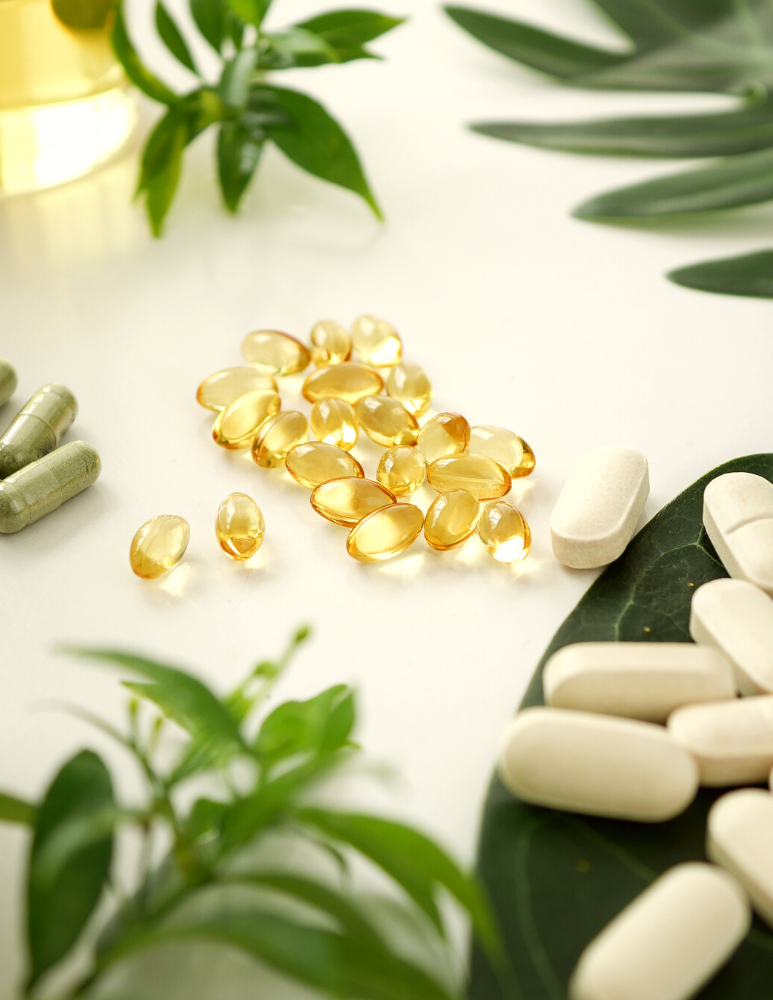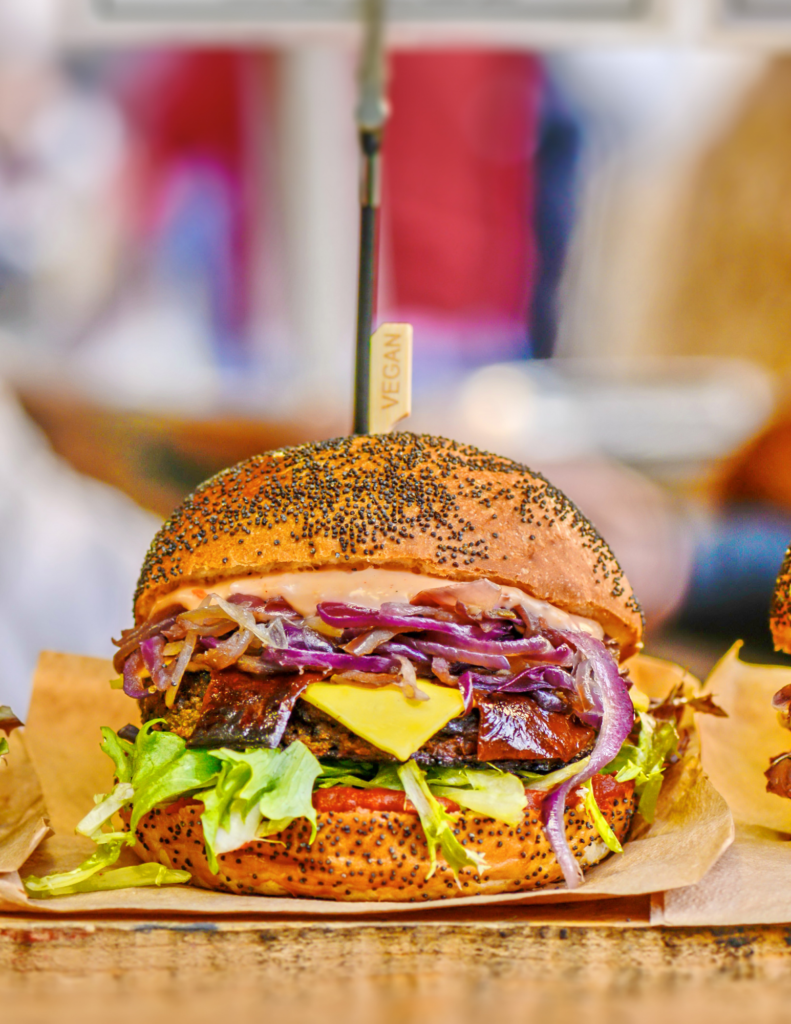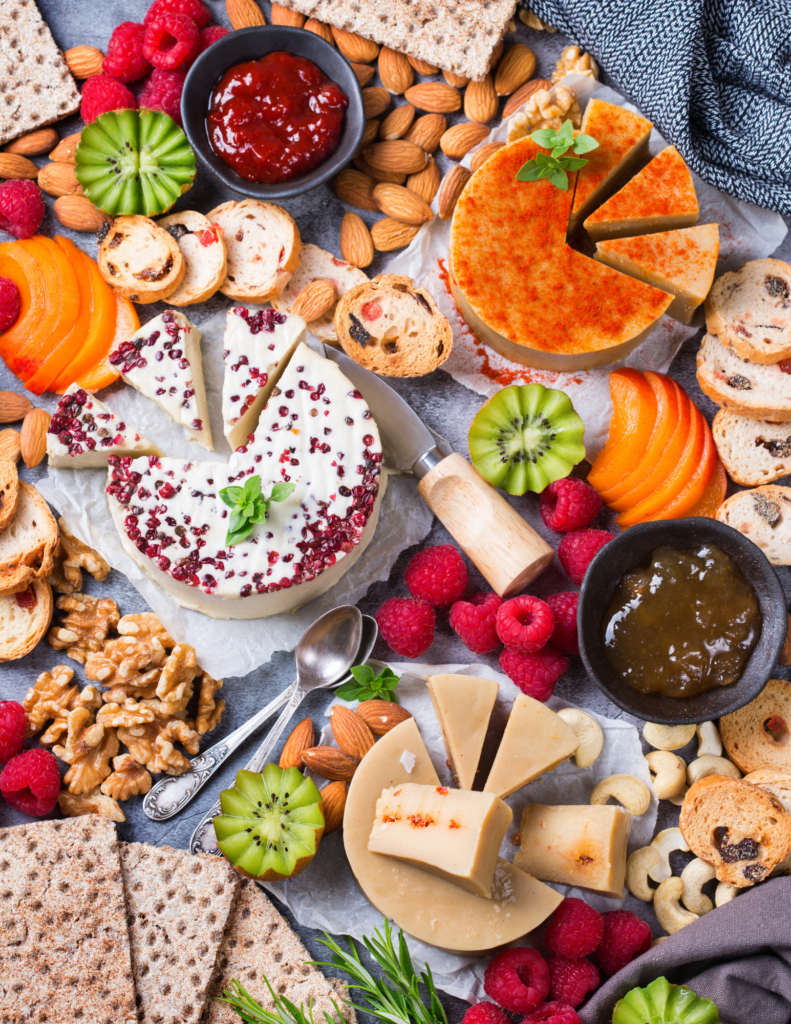If you are thinking of trying a plant-based diet, you’ve probably at some point heard a few common vegan myths. We all have!
For example, ‘Vegan food is boring and bland’. Then you take a look at the delicious plant-based recipes we make here at Healthiir and realize that this statement is nonsense.
This may have gotten you to start thinking: what other vegan myths are out there?
Quite a few it turns out – and we are here to set the record straight! What follows are some of the most notorious vegan myths around, and why you should stop believing them.
Table of contents
- Myth #1: ‘Only vegans need to supplement’
- Myth #2: ‘Dairy is essential for calcium and strong bones’
- Myth #3: ‘Vegan is always healthy’
- Myth #4: ‘Going vegan is difficult’
- Myth #5: ‘You can’t get enough protein on a vegan diet’
- Myth #6: ‘You can’t build muscle without meat’
- Myth #7: ‘Soy is bad for you’
- Myth #8: ‘Veganism is expensive’

Myth #1: ‘Only vegans need to supplement’
Yes – it’s true that vegans should pay attention to certain nutrients, such as vitamin B12 and iodine, as these can be harder to find regularly on a plant-based diet.
However, with proper planning, you can actually find all the nutrients you need as a vegan, without having to supplement. While this isn’t what we personally recommend, it is possible!
For example, many fortified foods such as nutritional yeast, plant milks, and cereals contain vitamin B12. Therefore, including these in your diet will give you all you need, without having to take a separate vitamin supplement.
Omnivores seemingly don’t have to plan their diets or take B12 supplements. However, when we look a little closer, we see that cattle are given B12 supplements as they are unable to obtain enough from the food they eat due to modern agriculture methods.
It turns out that meat eaters therefore do take B12 supplements, although they are hidden in the meat they eat. In short, everyone gets B12 from supplements or fortified foods, not just vegans.
Check out our guide on supplements to take on a vegan diet.

Myth #2: ‘Dairy is essential for calcium and strong bones’
No – in fact, we can rearrange the words a little to read, ‘Calcium is essential for strong bones, not dairy’.
Luckily, calcium is readily available in many plant-based foods. You will find it naturally in soybeans (and soy products like tofu and tempeh), legumes (beans, peas, and lentils), leafy greens like kale, spinach, bok choy, and collard greens, and some nuts and seeds.
Don’t forget about all those fortified foods like plant milks and breakfast cereals. As you can see, it is easy to hit your recommended calcium intake as a vegan!

Myth #3: ‘Vegan is always healthy’
Unfortunately, this one is also a myth.
Firstly, vegan living can be VERY healthy. As you cut out meat and dairy, your risk of certain cancers, obesity, heart disease, and diabetes all reduce. In fact, on a whole-food, plant-based (WFPB) diet, you can actually reverse some of these diseases.
But this is where ‘Vegan is always healthy’ falls down. Not all vegans eat a diet rich in whole foods, including fruits, vegetables, legumes, and grains.
Ultimately, potato chips and sugary soda are vegan. If you live off potato chips and soda (an extreme example, admittedly), obviously you won’t be considered a healthy vegan. Same goes for all the delicious-but-not-particularly-good-for-you vegan treats such as cookies, cakes, cheeses, donuts, hot dogs, and so on.
Ultimately, going vegan can do wonders for your health, but it’s not a magic cure. You still need to eat sensibly, and focus on consuming as many whole foods as possible.

Myth #4: ‘Going vegan is difficult’
In 1944, when veganism first appeared as an ideology, this may have been true as menus were restrictive and they didn’t sell oat milk in your favorite coffee house! But, in the 21st century, it couldn’t be less accurate.
Firstly, there are now vegan alternatives for every animal product, including meat, fish, dairy, and eggs. You can also create delicious meals from tofu, tempeh, legumes, and other healthy produce without compromising on taste, protein, or nutritional value in any way.
Then comes the way the world is now catering for vegans. We have vegan restaurants, vegan cafes, vegan grocery stores… even vegan butchers! Many non-vegan grocery stores and restaurants will offer multiple vegan choices too.
The list goes on… vegan protein powders, vegan vitamins, vegan cosmetics, vegan leather.
Veganism is everywhere, allowing you to live the life you want with no compromise. In 2022, going vegan is anything but hard. Yes, there is a learning curve (as there is with most things), but once you get over the initial learning/educational phase, it becomes effortless!

Myth #5: ‘You can’t get enough protein on a vegan diet’
We’ve ALL heard this one.
Let’s back up for a second, though. Protein is essential for life – building and maintaining tissue, providing structure to cells, and vital for biochemical processes in the body.
And the unfortunate truth is that most people truly believe that without meat, dairy, and eggs, you can’t get enough protein. Boy, are they wrong!
The following plant-based foods contain considerable protein:
- Tofu
- Tempeh
- Soy milk
- Beans
- Lentils
- Chickpeas
- Nuts
- Seeds
Oh, and we can’t forget about seitan, which contains a staggering 75g of protein in a 100g portion!
This list just scratches the surface – check out our guide to vegan protein for a closer look at this topic and more inspiration.

Myth #6: ‘You can’t build muscle without meat’
Firstly, see our protein argument above, as protein is crucial for building muscle. If you can get enough protein on a plant-based diet (which you can), then you can build muscle without meat.
You might find it interesting to look up some famous vegan bodybuilders, powerlifters, and athletes to reinforce this fact.
Here’s a list to get you started: Venus Williams, Patrik Baboumian, Morgan Mitchell, Nimai Delgado, Anastasia Zinchenko, Karl Bruder, Hannah Teter, Ryan Stills, Shelli Beecher-Seitzler… even former Mr. Universe Arnold Schwarzenegger is primarily vegan these days!

Myth #7: ‘Soy is bad for you’
The notion that soy is bad for you is a classic myth that is rolled out often. However, soy has been drastically misrepresented.
One of the worries is that soy contains estrogen, which is a compound that fuels the growth of breast cancer cells. However, soy actually does not contain estrogen (an animal hormone). It contains phytoestrogens (plant hormones), which are not only shown to be 1,000x weaker than animal estrogen, they’re also beneficial to health and are actually used to help fight breast cancer.
Dairy milk, on the other hand, does contain estrogen. It makes sense – coming from a pregnant cow with the aim of helping its baby grow into a 1,500 lb animal.
The presence of this hormone, in addition to pesticides, steroids and antibiotics, make dairy one of the worst health choices you can make.
Soy is actually good for most people. It is packed with protein, calcium, iron, and fiber. There’s no need to fear it!
However, the two situations in which you might want to avoid soy is if you have already been diagnosed with a thyroid problem or iodine deficiency. In this case, it’s best to consult with a doctor before consuming it, as it may affect the absorption of medications.
For more information on soy, check out our article: Is Soy Bad For You?

Myth #8: ‘Veganism is expensive’
Like anything you buy, you can make veganism very expensive if you want. For example, if you buy ready-to-eat meals every day, pricey vegan substitutes, and eat out at vegan restaurants a few times a week, then yes, plant-based eating can certainly add up!
However, if you stick to whole-foods such as fruit, vegetables, grains, and legumes, nuts, and seeds, then supplement this with a few of your favorite plant-based alternatives, eating vegan can be very cost-effective.
In fact, it can be cheaper than a diet that includes animal products. Just compare the price of a can of chickpeas to a chicken breast and you’ll see what we mean.
Plus, while plant-based meat, egg and dairy alternatives used to be a little expensive, as more brands enter the market and competition becomes tougher, prices have dropped.
There you have it – some vegan myths and the truth revealed! Which vegan myths have you heard?

